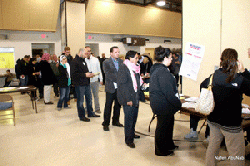DEARBORN — Election day in Dearborn did bring out a large number of Arab Americans to local precincts, but along with it came several issues that many voters feel need to be addressed.
At the Salina Elementary School precinct in the south end of the city, some individuals had a less than satisfactory experience. State Representative Rashida Tlaib, who was monitoring the precinct during the afternoon on behalf of the Democrat party, said that many voters had difficulties during the course of the day. Tlaib says the precinct ran low on supplies, had very few translators to assist bilingual voters and many residents were at first denied voting due to errors in the system.
“I’m working for the Michigan Democratic Party in helping voter protection and they asked me to come out here when there were some issues. There are a lot of Middle Eastern names that are very long and some of the clerk workers are denying them the right to vote because there might not have been a hyphen in their name. There were also a few people who had their voter cards but were not registered in the system, so I was monitoring all that and making sure that they were still allowed to vote. They had their registration cards, they had their ID’s so they should have the right to vote,” Tlaib stated.
Tlaib added that she was dissatisfied with how the city clerk has been handling some of the precinct locations.
“The lack of training for these clerk workers and supervisors is very daunting. It has slowed down the process and my goal was to make sure that a lot of folks didn’t feel intimidated. There is a lot of reform that needs to be done. We should always have translators at these locations. We were also very low on supplies…we ran out of pens, we ran out of manila folders, I even had to go get strings to tie the pens to the booths, it was just really messy. More importantly is you got a supervisor at one of these precincts that’s obviously got some issues and he doesn’t know the rules. For having one of the most diverse cities in the state, Dearborn should be doing a lot more to address these problems,” Tlaib said.

Salina wasn’t the only precinct that experienced some setbacks. There was also issues among Arab Americans at William Ford, who needed translators to help them vote. While many translators were at the precinct, there were some complaints that it wasn’t enough.
According to sources, over at the Kennedy Plaza precinct, computer malfunctions led to voter delays for over three hours. Complaints also came out of the Becker precinct, where residents were criticizing poll workers for being too slow, leading to extremely long lines.
Cindy Galea, the Election Supervisor for Dearborn told us in a phone interview that they received several complaints on election day, but she stressed that the city clerk’s office tried their hardest to make sure that multiple interpreters were available at every precinct, especially on the east side. The city clerk’s office had reached out to ACCESS, who gave the city at least 30-40 people who were bilingual and also understood how to work the computer system.
Galea stated that all the poll workers were put through two training sessions, but by the end of those sessions many of them had decided to drop out of participating completely, because they had found the process to be too difficult or time consuming. With 50 precincts in the city, the interpreters had to be divided accordingly.
Some other issues that occurred on election day included longer lines that resulted in precincts having to add in booths at the last minute, which she says was the problem at the Salina precinct. According to Galea, more supplies was sent over to the precinct after more voting booths had been added.
A couple of power outages also occurred at some precincts inside of older buildings that did not have the adequate outlets for the systems.
One minor problem that occurred at several precincts was reports of soliciting from several poll workers. According to Galea, this wasn’t a major issue but there were a couple of cases of bilingual poll workers who were assisting residents regardless of whether they asked for help or not, which is against voting guidelines. Interpreters are only supposed to assist residents when they ask for help.
Other residents also say that some of the poll workers were biased or were refusing to cooperate with bilingual residents. One issue that emerged at the Lowery precinct on the east side of the city ended with Dearborn Police having to be called onto the scene.
A local man tells us that when he was waiting in line, he noticed that a poll worker was not communicating clearly with bilingual residents. The local man says he offered to help the poll worker interpret for residents who were confused about straight party voting. The poll worker initially agreed that the local man could help interpret for residents and he was able to assist voters for over two hours.
However after 8:00 p.m., the poll worker had an issue with the local man still being inside of the polling location because the polls had closed. The local man said he refused to leave because people were still inside placing their votes and needed guidance. The poll worker became irritated and called the police, claiming that the local man was a disturbance. While no arrests were made, police did make a report of the incident.
Galea stated that for future purposes, residents should know that they are able to bring an interpreter with them to assist them with the ballots. Sample ballots are also available at the city clerks office, if some residents need to see the ballots before hand so they are prepared for elecion day.






Leave a Reply